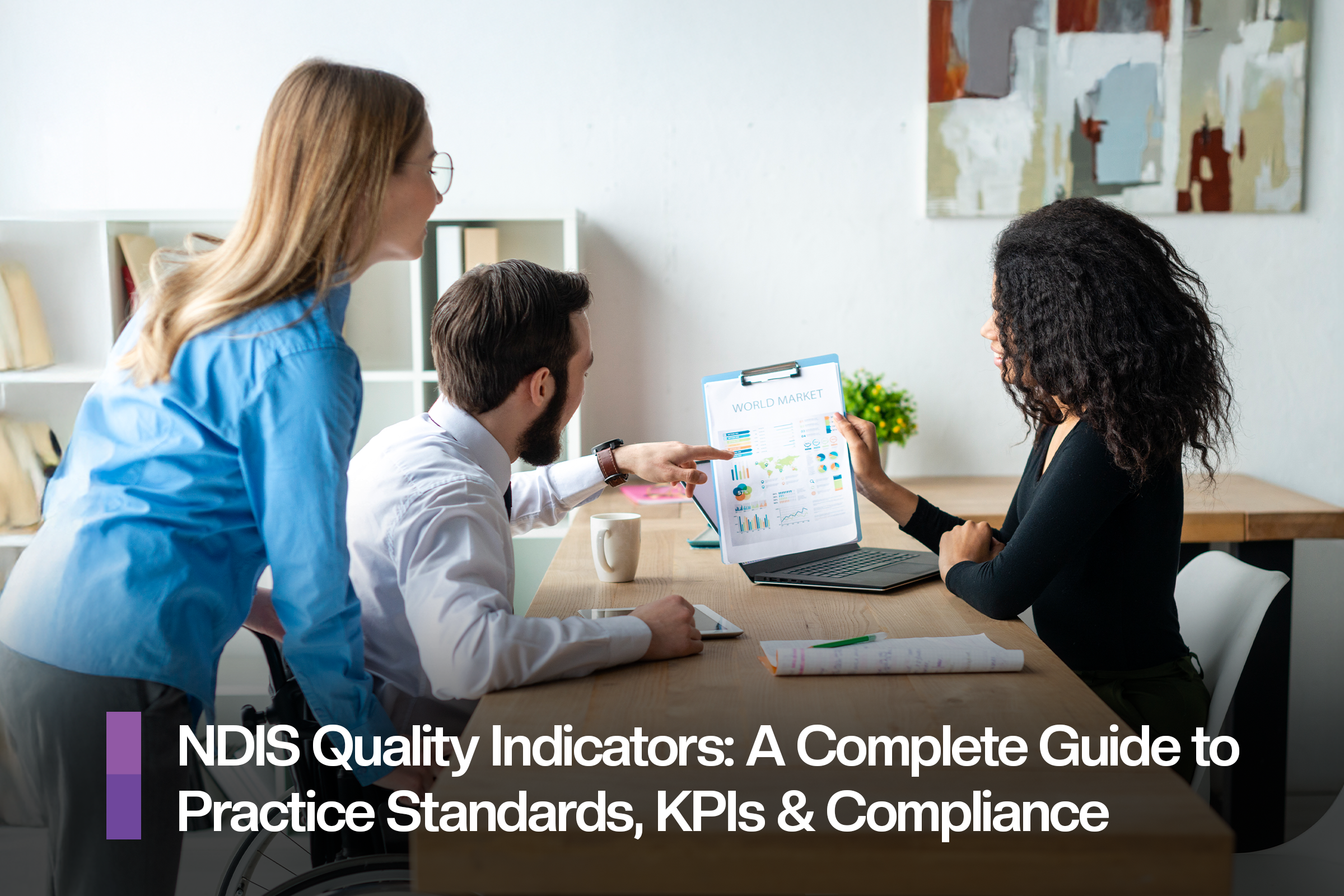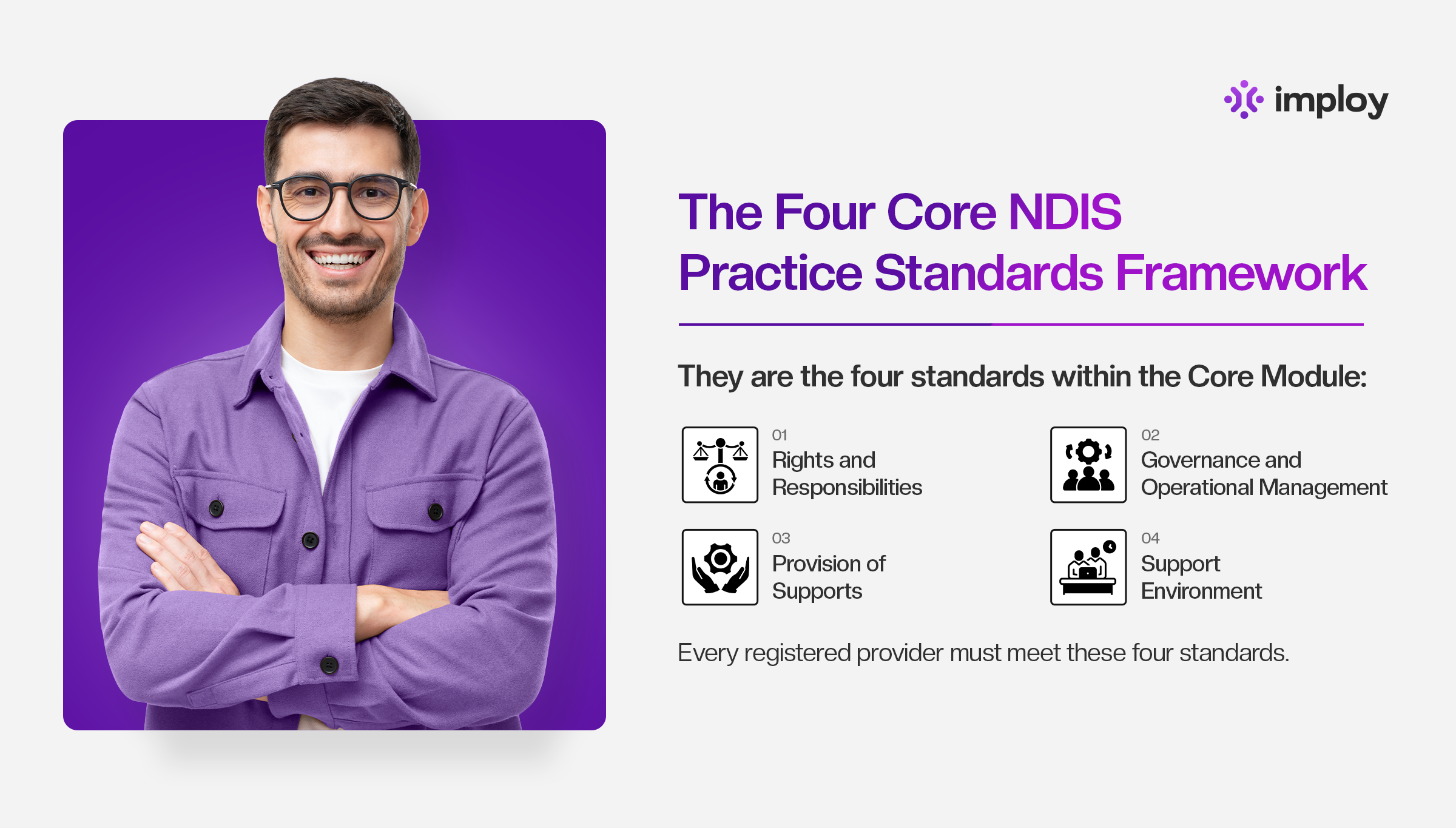NDIS Quality Indicators: A Complete Guide to Practice Standards, KPIs & Compliance
Learn everything about NDIS Quality Indicators, Practice Standards and KPIs. A complete guide for providers to meet standards, improve services, and succeed in NDIS audits.

The National Disability Insurance Scheme (NDIS) is designed to empower participants with choice, control, and high-quality supports. To safeguard these outcomes, providers must meet NDIS Practice Standards and demonstrate compliance through Quality Indicators.
But what exactly are quality indicators? How do they connect to KPIs, audits, and compliance? And more importantly, how can providers implement them effectively in everyday practice?
This guide gives you comprehensive coverage of all modules, core and supplementary standards, real-world examples, and compliance strategies making it the most complete resource compared to the top 10 NDIS articles online.
The NDIS Quality Framework: What It Is & Why It Exists
The NDIS Quality and Safeguarding Framework ensures that services are safe, consistent, and participant-focused. It forms the backbone of NDIS regulation, covering:
- NDIS Practice Standards are measurable benchmarks for providers.
- Quality Indicators are evidence-based criteria that auditors use to assess compliance.
- The NDIS Commission is the regulatory body overseeing provider conduct.
- Continuous Improvement embedding feedback, governance, and accountability into practice.
This framework is not just about ticking compliance boxes, it’s about empowering participants and building trust in disability services.
Modules & NDIS Practice Standards
The Practice Standards are structured into modules. Each module includes quality indicators that define what good practice looks like.
1. Core Module (applies to all providers)
- Rights & Responsibilities protecting human rights, informed choice, inclusion, and accessible communication.
- Governance & Operational Management risk management, financial accountability, and effective leadership.
- Provision of support for responsive support planning, service agreements, and participant engagement.
- Support Environment ensuring safety, dignity, medication management, mealtime safety, and property protection.
2. Supplementary Modules (apply depending on services delivered)
- High Intensity Daily Personal Activities
- Specialist Behaviour Support
- Implementing Behaviour Support Plans
- Early Childhood Supports
- Specialised Support Coordination
- Specialist Disability Accommodation (SDA)
3. Verification Module (for lower-risk supports)
- Focuses on HR, risk management, complaints, and incident handling, streamlined but still rigorous.
NDIS Quality Indicators: What They Are & Why They Matter
A quality indicator is a measurable outcome statement that demonstrates whether a provider is meeting the Practice Standards.
For example:
- Rights & Responsibilities: Do participants feel informed and respected in decision-making?
- Governance: Are risks documented and acted on?
- Provision of Supports: Are service agreements clear and followed?
- Support Environment: Is medication safely administered and documented?
Auditors use these indicators to check both policies and practices. This means providers must show evidence in action, not just paperwork.
The Four Core NDIS Practice Standards
They are the four standards within the Core Module:
1. Rights & Responsibilities
Participants have the right to dignity, privacy and choice.
Providers must:
- Respect and protect participant rights
- Give clear information about supports
- Have easy ways to handle complaints and incidents
2. Governance & Operational Management
Providers must run their service safely and effectively.
This means:
- Strong policies, procedures and risk management
- Skilled staff and good record-keeping
- Leaders checking compliance and driving improvements
3. Provision of Supports
Supports must be person-centred and goal-driven.
Providers need to:
- Plan services around each participant’s goals and culture
- Have clear service agreements and pricing
- Deliver consistent, high-quality support
4. Support Environment
The places and conditions where supports happen must be safe.
Providers must:
- Keep participants free from harm, abuse and neglect
- Ensure equipment and spaces meet safety standards
- Have emergency, infection control and medication safety systems
Every registered provider must meet these four standards.

KPI in NDIS: Measuring Success Beyond Compliance
Key Performance Indicators (KPIs) are internal metrics that help providers track performance and demonstrate quality improvement.
Examples of KPIs in an NDIS context:
- Participant satisfaction scores
- Number of complaints resolved within the target time
- Staff training completion rates
- Incident frequency and resolution speed
- Plan utilisation rates
By aligning KPIs with quality indicators, providers can show both auditors and participants that they are committed to ongoing excellence.
The NDIS Quality Framework & Its Principles
The NDIS Quality Framework is underpinned by principles that guide service delivery.
The 5 principles of the NDIS Service Charter are:
- Transparent - clear and open communication.
- Responsive - adapting to participant needs.
- Respectful - valuing diversity and dignity.
- Empowering - enabling independence and choice.
- Connected - ensuring supports are community-oriented.
Providers who embed these principles naturally perform well in audits.
Practical Examples: How Providers Meet the Standards
Let’s look at real-world examples of how providers apply indicators:
- Rights & Responsibilities: A provider develops easy-read service agreements and trains staff in cultural competence.
- Governance: An organisation implements quarterly risk reviews and publishes accountability reports to participants.
- Provision of Supports: Staff work with participants to co-design support plans, which are reviewed every six months.
- Support Environment: A provider creates an emergency management plan for participants with complex health needs, including mealtime and dysphagia protocols.
- Supplementary Example: In behaviour support, a provider ensures restrictive practices are minimised and reviewed with behaviour specialists.
These practices not only meet standards but elevate participant trust and satisfaction.
NDIS Compliance: Audits, Evidence & Continuous Improvement
To stay compliant, providers must undergo regular audits. Auditors review:
- Policies and procedures.
- Incident and complaint records.
- Staff training logs.
- Feedback and engagement data.
- Evidence of participant outcomes.
Top tip for providers: Treat audits as opportunities for improvement, not hurdles. Conduct internal self-assessments, use KPI dashboards, and close feedback loops with participants.
Challenges & Common Pitfalls
Many providers struggle with:
- Over-focusing on paperwork while neglecting practice.
- Staff are unaware of new standards like mealtime management, severe dysphagia, and emergency preparedness.
- Failing to engage participants in feedback processes.
- Inconsistent implementation across service areas.
Avoiding these pitfalls requires ongoing staff training, system reviews, and participant engagement.
How Imploy Can Help
Imploy bridges the gap between NDIS compliance requirements and day-to-day service delivery. Instead of scrambling for paperwork at audit time, providers can embed Quality Indicators into their normal operations and keep evidence up to date automatically.
- Automate training records, staff certifications, and policy expiry reminders
- Link KPIs like participant satisfaction, complaints, and utilisation rates to live dashboards
- Store incident reports, shift notes, and restrictive practice logs securely in one place
- Generate audit-ready compliance reports in seconds
- Collect and track participant feedback to show continuous improvement
- Roster only qualified, compliant workers to minimise risk
FAQs
1. What are the four core NDIS practice standards?
The four standards within the Core Module: Rights & Responsibilities, Governance & Operational Management, Provision of Supports, and Support Environment.
2. What is KPI in NDIS?
KPIs are performance measures (e.g., participant satisfaction, complaint resolution, staff training) that align with quality indicators to track service quality.
3. What is the NDIS quality framework?
It is the regulatory system that sets the standards, indicators, and safeguards to ensure safe, high-quality support.
4. What are the 5 principles of the NDIS Service Charter?
Transparent, Responsive, Respectful, Empowering, and Connected.
5. How do new standards affect compliance?
Providers must now demonstrate compliance with mealtime management, dysphagia protocols, and emergency preparedness in addition to traditional standards.






